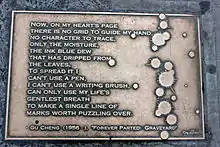Gu Cheng
Gu Cheng (simplified Chinese: 顾城; traditional Chinese: 顧城; September 24, 1956 – October 8, 1993) was a famous Chinese modern poet, essayist and novelist. He was a prominent member of the "Misty Poets", a group of Chinese modernist poets.
Gu Cheng | |
|---|---|
| Born | September 24, 1956 Beijing, China |
| Died | October 8, 1993 (aged 37) Ostend, Waiheke Island, Auckland, New Zealand |
| Occupation | Writer |
| Language | Mandarin Chinese |
| Period | Contemporary |
| Genres | |
| Literary movement | |

Biography
Gu Cheng was born in Beijing on 24 September 1956.[1] He was the son of a prominent party member and the army poet Gu Gong.[1] At the age of twelve, his family was sent to rural Shandong because of the Cultural Revolution (as means of re-education) where they bred pigs. There, he claimed to have learned poetry directly from nature.
In the late 1970s, Gu became associated with the journal Today (Jintian) which began a movement in poetry known as "menglong" 朦胧 meaning "hazy", "obscure". He became an international celebrity and travelled around the world accompanied by his wife, Xie Ye. The two settled in Rocky Bay, a small village on Waiheke Island, Auckland, New Zealand in 1987. Gu taught Chinese at the University of Auckland in the City of Auckland.
In October 1993, Gu Cheng attacked his wife with an axe before hanging himself.[2][3] She died later on the way to a hospital. The story of his death was widely covered in the Chinese media.[4]
"A Generation"
The two-line poem titled "A Generation" ("一代人") was perhaps Gu Cheng's most famous contribution to contemporary Chinese literature. It had been considered an accurate representation of the younger generation during the Chinese Cultural Revolution seeking knowledge and future.
(translated by Juan Yuchi)
The darkest night gave me dark-colored eyes
Yet with them I'm seeking light
黑夜给了我黑色的眼睛
我却用它寻找光明
Legacy
Gu Cheng's life was dramatised in the 1998 film The Poet (Chinese: 顧城別戀; pinyin: gùchéng bié liàn), which focussed on his recurrent depression and the murder of his wife.[5]
References
- Anna Simona Margarito (August 2012). "Reflections of the West in Gu Cheng's Life and Poems" (PDF). Asian and African Studies. Ljubljana. XVI (2). ISSN 1408-5429. Archived from the original (PDF) on 29 November 2014. Retrieved 18 November 2014.
- "Chinese Poet, Wife Die in Murder-Suicide: AUCKLAND, New Zealand (AP) _ Chinese poet Gu Cheng, who left his homeland in 1987, killed his wife before hanging himself from a tree, police said today. His wife, Xie Ye, 35, had been beaten on the head with a tomahawk and was found lying on a path leading to a house. She was taken to a hospital, but died 90 minutes later". 9 October 1993 – via apnews.com.
- "The Sydney Morning Herald, WELLINGTON, Sunday - The exiled Chinese poet Gu Cheng, whose name had been put forward as a possible Nobel Prize contender, hanged himself after killing his estranged wife with an axe in New Zealand, police said today. Gu Cheng, 37, killed his wife, Xie Ye, 35, on Friday outside a house on the picturesque Waiheke Island - near Auckland - where she had been staying, Detective -Inspector George Wood said. The poet was found hanged from a tree". 11 October 1993 – via groups.google.com.
- "A voice for China's bottom rung". 11 November 2011 – via www.nzherald.co.nz.
- "顾城别恋 顧城別戀 (1998)" [The Poet/The Poet (1998)]. Douban (in Chinese). Retrieved 31 July 2017.
Further reading
- Chinese Writers on Writing featuring Gu Cheng. Ed. Arthur Sze. (Trinity University Press, 2010).
- Sea of Dreams: Selected Writings of Gu Cheng translated and edited by Joseph Allen. (New Directions: 2005)
- Selected Poems by Gu Cheng edited by Seán Golden and Chu Chiyu. (Renditions Paperbacks, 1990)
- Poemas oscuros: Antología de Gu Cheng, traducido del chino por Javier Martín Ríos; revisión al español de Sun Xintang. (China Intercontinental Press: 2014).
External links
- Dead in Exile: The Life and Death of Gu Cheng and Xie Ye by Anne-Marie Brady. A personal account and review of several books about Gu Cheng and Xie Ye's last days.
- Gu Cheng's Fortress official website by a small group of people who studied Gu Cheng's work.
- Prólogo al libro Cuatro Poetas Suicidas Chinos (Cinosargo 2013- Trad. Wilfredo Carrizales)
- Crítica de Leonardo Sanhueza al libro Cuatro Poetas Suicidas Chinos (Cinosargo 2013)
- Crítica de Alberto Hernández al libro Cuatro Poetas Suicidas Chinos (Cinosargo 2013) en Letralia